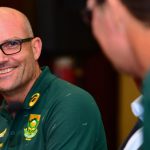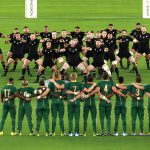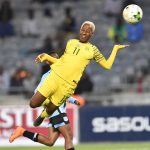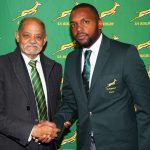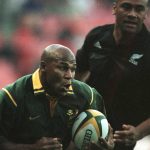The Sharks’ transformation champion
While doing his thesis on transformation, Sharks head Eduard Coetzee concluded that it’s more about inclusivity, and that development programmes can be quite disrespectful and racist.
Author:
15 February 2020
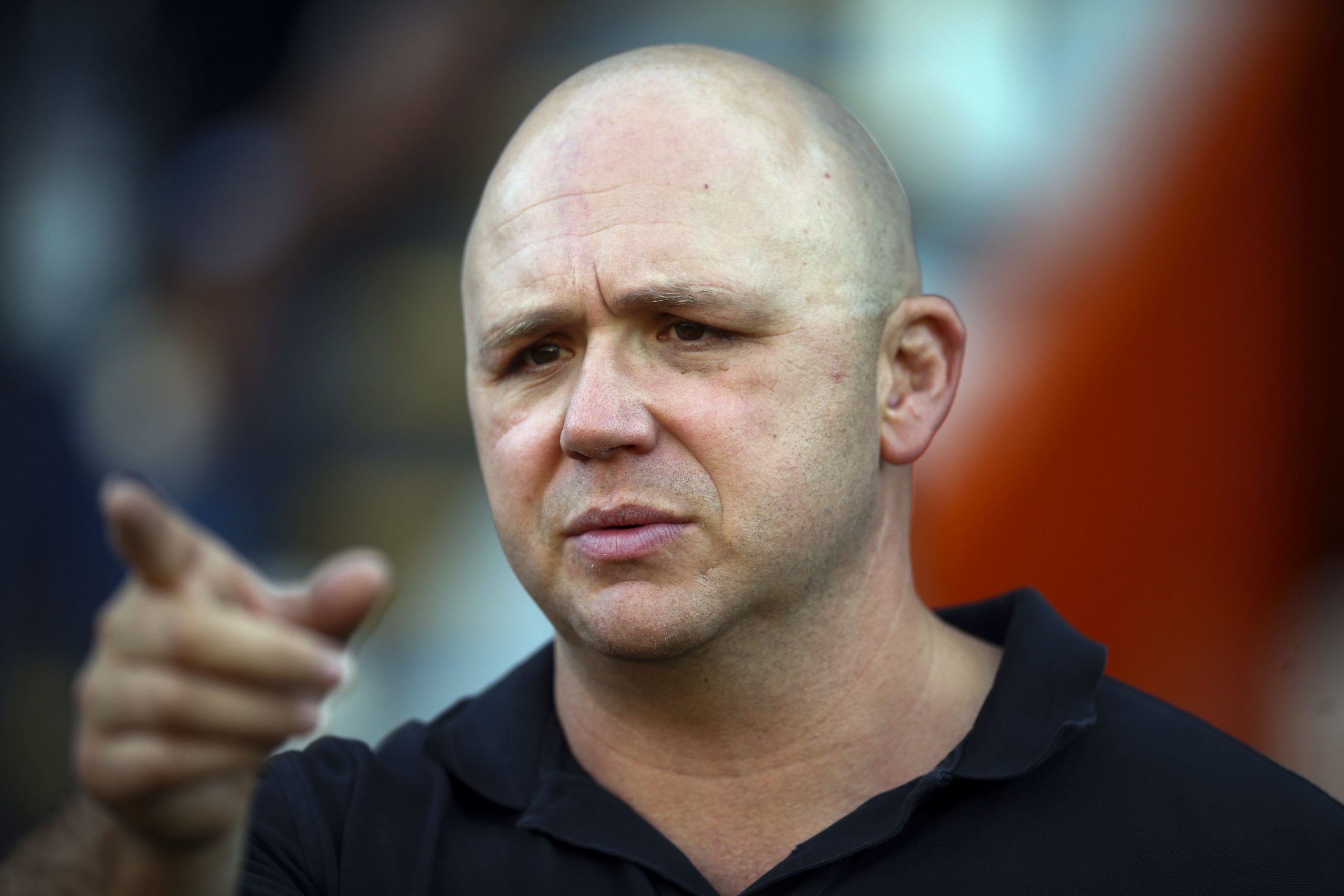
When Eduard Coetzee left Pretoria for Durban 19 years ago, his mother pleaded with him to promise that whatever he did on his travels, he wouldn’t marry an English girl.
Having reassuringly told his mum, “Nooit, Ma. Nooit (Never, Mom. Never)”, Coetzee went on to marry an English-speaking woman and have three quite different sons – one being mainstream, another having a sensory profile best addressed by home schooling and the youngest being vegan – who were all born in France.
And when you throw in the fact that the former Sharks prop is now a naturalised Frenchman after spending eight and a half years there playing for Bayonne and Biarritz – and becoming a banker – it’s clear that Coetzee’s done a bit more than just colour outside his mother’s conservative lines.
So when the 40-year-old, who took over as the Durban franchise’s chief executive in July, did his thesis on transformation for his doctorate in leadership studies last year, it was as surprising as it was not.
Related article:
Forget the cosmopolitan nature of his recent past, Coetzee’s appearance and demeanour (he turned up for this interview in a pink flannel shirt, chinos and red All Stars, and has a tendency to sum up his statements with a neat one-liner, when he’s not losing his train of thought because his ideas seem to be competing to all come out at once) are congruent with him studying what he prefers to call inclusivity.
The fact that he is a South African rugby administrator who has gone through the trouble of analysing transformation to the tune of producing a 286-page, 90 000-word document, is the surprising bit, what with the establishment walking a fine line in treating the subject like a chore.
You can set your clock by transformation flaring up as a racially divisive topic in South African sport, and the latest example is the cricket Test series against England.
Following the Temba Bavuma in, Faf du Plessis out, or vice versa, cricketing conjecture, you could have sworn that the Proteas lost the series because there either weren’t enough black players or too many white players – and coaches – in the team, when the problems seem to be structural even to a casual observer.
Related article:
But the South African way is to draw a straight, not to mention black and white, line through the massive grey area of centuries of bitter race relations that make up this country’s history. Too often an epic win, or a devastating loss, can be reduced to simply how many black or white guys were on the pitch when it happened.
Bavuma, a man who stands at 1.62m tall and doesn’t strike one as having ever needed to rely on favours to become an international cricketer, suddenly found himself the cause celebre for social media insisting that he be included in the team despite being skint on the currency that should have done his bidding – runs.
When he was finally included but didn’t silence anyone with something approaching a two-fingered salute half-century, his detractors held it up as a case in point for why he should never have been selected, which is a little simplistic in a game that prides itself on being a more accurate metaphor for life than other sports.
White privilege
Former Proteas batsman Jonty Rhodes helpfully joined the fray by pointing out the obvious: that he was lucky to build a memorable career despite being chosen on the basis of negligible statistics, and that when he was selected it was only against other minority white players that he was competing.
In the midst of all these competing narratives, the truth is not only somewhere in the middle, it also almost always comes off second best to the subjective commentary. Which begs the question of why Coetzee went to the trouble of trying to unearth a version of it.
“I went to Affies, you know,” he begins with a chuckle, referring to Afrikaanse Hoër Seunskool in Pretoria. “While I’m proud because it was an unbelievable school, I understand how that can isolate you. Back then you either studied law or accounting after school so you could be safe, so I studied accounting and did my honours in financial planning.
“I then went overseas because everyone told me I was blocked here because of transformation, when I was scared that there was no future for a white male in the country. But then I realised that what I was running away from was following me, that I had to change the way I think.
“I came back and I realised that you don’t know what you don’t know. I don’t know how you grew up … I can assume things but we all know what they say about assumptions.”
As much as his experiences in France went a long way towards changing the way he thinks, it was Sharks chairperson and pharmaceutical tycoon Stephen Saad who steered Coetzee towards his transformation study.
“I went to him to ask if the Sharks could fund my EMBA [executive MBA, or master of business administration]. He said, ‘Why, you’re a robot, you think like a robot.’ He told me to go find something that would change how I think, so I found this course on inclusive innovation.
“Inclusivity is exactly what it says. How do you build something that is inclusive of all races, genders and cultures? I thought that’s what rugby, sport and South Africa needs. I don’t know how to do it, but I want to understand how to do it.”
Related article:
The deeper he delved into the subject, the more it debunked the stereotypes with which he’d grown up: “I needed to do the study because it is research-based. If you ask me why, I’ll tell you it’s because I can tell you that in 1896 a coloured club was formed in Griqualand West. That’s facts, not a story.
“There are a lot of lies that say coloured and black people never played rugby. A lot of white people believe that, and that’s not because they’re trying to be racist. That’s what we were taught, which ties back to what I said, that you don’t know what you don’t know.”
As a result of some of his findings, Coetzee has arrived at a different definition of transformation to the rest of the country.
Related article:
“Transformation is not me taking the sport to people who never knew it,” he explains. “It’s almost reigniting the flame, it’s almost humbling yourself and saying, ‘I’m sorry, this was wrong, how do we fix it?’ You take the anger and the emotion out of it and go through a process of integrity and transparency.
“Up until now transformation and development programmes were quite disrespectful and actually racist in how they were done. You load a bakkie with some cones and T-shirts, and you go and do a mass display session. Then you pack your bakkie, give the okes a T-shirt, then you leave. What’s your legacy?
“I grew up believing transformation was about black and white. Then I realised that the fruit of a system was transformation between races. But I think we’ll never fully fix that because there are too many people that drive other agendas that want separation to stay, because that’s how they stay relevant.”
Bridging the divide
Coetzee knows firsthand how to deal with white people who feel they have a greater claim to the ownership of rugby than their black counterparts, having been confronted by a disgruntled season-ticket holder in his previous role as chief operating officer at the Sharks.
The conversation went something along these lines:
Ticket holder: I’m looking for that Coetzee guy who’s selling the Sharks to the blacks.
Coetzee: I don’t understand?
Ticket holder: You signed that deal with the ANC government (the Department of Tourism) and now you’ve signed with Gagasi whatever…
Coetzee: Gagasi FM, they’re the biggest commercial radio station in the country. I don’t understand, what is the problem here?
Ticket holder: I’ve been a season-ticket holder for 20 years…
Coetzee: You know what, you’re extremely important to us and I’d like you to remain a season-ticket holder. But you have to understand there’s a strategy here, which is transparent and inclusive. Let me explain something to you, I’m white, you’re white and we only make up 7% of the population. If I lose 20% of the 7% percent, but I gain 20% of the 93%, I’ve done a good job.
Ticket holder: Ja, but…
Coetzee: We’ll never turn our back on the people who have been good to us, that’s inclusivity. In an inclusive environment, you’ve got the people who have supported us for 25 years, you treat them well, and you’ve got the new people, and you also treat them well. You treat everybody well.
“Long story short, he renewed his season ticket. He just wanted to vent,” says Coetzee, who is at pains to point out that his approach is not about out with the old and in with the new.
Related article:
“We’re not saying to a white guy you’re worth nothing now because you had it good. You’ve got a place, but your place is alongside someone who wasn’t there before because we’re not going to go back to what we did 20 years ago.
“I once told the guys at the Leaders in Sport conference that the thing about South Africa is that we’ve lanced the boil. The people who aren’t happy are in Australia, New Zealand, America and the UK. The guys who are here want to make a go of it.
“We went to France, got naturalised there, my kids were born there. But I came back here because I want to be here. It’s not the cards that I’ve been dealt. That’s a huge lightbulb moment, because then it’s your choice to be here.”
To that end, Coetzee – perhaps safe in the knowledge that the generator that spluttered to life in the distance would do just that – barely raised an eyebrow when load shedding kicked in at Kings Park Stadium during the interview, unlike many fellow countrymen who would have taken it as yet another opportunity to complain.
Transformed, and commercially viable
Coetzee was keen to point out that a lot of our problems are not uniquely South African. He captained a Biarritz team made up of 11 different nationalities and Zimbabwe-born former United States wing Takudzwa Ngwenya had bananas thrown at him.
“That’s a different transformation because that’s also inclusivity. It’s no different to here, actually, we just want to put the racial thing in front and rehash a painful past to keep people separate.”
His opinions are big and his facts valid, but Coetzee is loath to publish his thesis for fear sections of it will be misinterpreted. “I’m worried about somebody taking it and driving an agenda. South Africans are uncomfortable talking about transformation.
“A black guy and a white guy are uncomfortable talking about their differences because as soon as they don’t agree, it’s a racial thing, when maybe they just don’t like each other as people.”
Coetzee’s challenge is to use his findings to help him run a transformed, not to mention a commercially viable, Sharks franchise.
Related article:
“Listen, my study is not going to change the economic environment of South Africa,” he says. But he does have plans for the team, its supporters and staff.
“I said at the Sharks we only speak English,” he says. “I’m proudly Afrikaans, but to drive an inclusive culture we only speak English. You can’t visit culture, you have to live culture. One must be very careful to say they don’t see colour, for us it’s become a culture thing.
“We’re never going to fix racism because we’re always going to have racists, because it drives their populist narrative. [But] you should spend time with the players to see if I’m talking bullshit, because I’m just the driver of the culture. They live it.”
Looking at the lack of attendance at stadiums, Coetzee says the consumer has changed in terms of the options available to them. He chooses not to see it as a crisis that 20 000 people, as opposed to 50 000, turn up at a stadium, choosing to ask instead: “Where else do they have 20 000 people attending events?”
That said, he is keen to bring them all together under the same roof by catering for varying interests. These include gaming, going out for coffee, looking after children in an on-site crèche or even catering for vegans at a stadium where a significant part of the stadium experience was braaing on the outfields.
Naturally, some of those people are black. “The biggest thing is that within rugby, your LSM [Living Standards Measure] is at a certain level where it’s different to football. So don’t just copy and paste and think you’re going to get black people to come to rugby.
“That’s where a study like this has to be done very carefully, because it can be perceived as generalised racism, where you say ‘black people are like this’. There are 70 million black people, how can you say a sample of that many people like one thing?”

